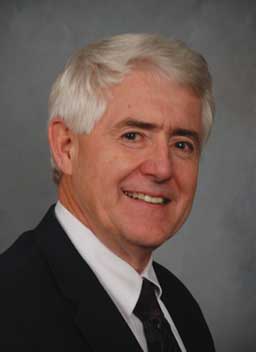President’s message: An end to an era?
To ad lib a quote from the famous playwright Arthur Miller, “an era comes to an end when society’s basic illusions are exhausted.” This comment is a reminder that often our basic paradigms are doomed to revision and, for many of them, eventual outright rejection. “The world is flat” comes to mind, but there are many others not so obvious. The past several years have certainly led us to question old dogmas that as veterinarians we have held dear. By the same token, we also call into question the dogmas of those who criticize our well-intentioned efforts. The veterinary medical profession is changing to facilitate and respond to society’s illusions as well as to its needs. Our new graduates mostly have urban backgrounds. Most often, they are young ladies who are significantly driven to make the world a better place for themselves and the animals they will superintend, while meeting the growing demand for greater veterinary expertise and care for our companion animals. Likewise, there have been significant changes in the food-animal industry that require far greater expertise and ingeniousness of the new veterinary graduate.
One of the illusions particularly unsettling to those of us with longstanding grey is the new paradigm that we must meet the non-science-based perceived psychological requirements of the food animal and also accept a perpetrated feeling of guilt for eating meat, all the while providing continuous health management and improvement in a humane manner. It has been our attitude that this latter effort is adequate to meet the needs of society. Perhaps this is our exhausted illusion, but the sovereignty to provide healthy-humane professional care can never be lost. For many of us, it is the consuming public’s disillusion that all will be acceptable when pork arrives from pigs given every opportunity to express some preconceived expression of what may be considered natural behavior. Science has been a loser in this debate and apparently always will be. It takes more than scientific study to quell this and other illusions associated with modern pork production.
Another modern-day illusion is that the public media, especially the Internet variety, has the public interest in mind and that honesty and truth provide the impetus behind each and every story. Recent personal experiences with reporters and other media journalists as a fallout from the H1N1 emergence in humans has brought home the cold, stark fact that often it is more about sensationalizing an illusion rather than protecting and educating an innocent society. As humans we starve for news – for facts – for motivation – for inspiration. But instead, we discover that news worthy of press time is often contrived out of agendas and journalistic ignorance along with significant dramatization of opinion, partial information, and frequently misinformation. Those who have the most money and power “make” the news. There are those reporting who have lost touch with a once time-honored profession of yesteryear. Journalism was historically the guardian of public trust – the guardian of common sense – protector of the innocent and the voice of common humankind. However, these are not the only improprieties of modern-day journalism. Quantum-speed reporting is challenging, thus sources must be impeccably trusted to meet the demand of almost instant messaging in every form of media production. Unfortunately, manipulation has stealthily and insidiously crept into the journalist’s daily quest for reportable news. This has been witnessed repeatedly from military spin-doctors to special interest “saviors,” often with wealth-driven motives, and yet we still fall for the big news splash over and over again. The recent emergence of a new human influenza is testimony of what the media frenzy can do to an industry. Frequently forgotten is the fact that industries represent real people depending on a livelihood to feed, nourish, and care for current and future generations of Americans.
Perhaps it is our own illusions – those steeped in the belief in hard work, honesty, integrity, fairness, and oh, by the way, it’s OK to raise pigs for food – which should be re-examined. Or is it the illusions of a self-righteous agenda which provides wealth for the elitist leadership while ignoring the sanctity of more basic societal needs? Greed drives many of the carefully varnished motives of many special-interest lobbyists.
Perhaps the flickering illusions of an exhausted era are upon us. Perhaps not! There is evidence of progress towards greater understanding of industry by a society that demands transparency. The communications skills of our industry march on in an ever-improving fashion. The truth is, we raise pigs for food. High-quality protein is essential for cognitive development of our children and the multitude of children in the developing world. The developing world clamors for food, and as personal incomes grow, so does the desire for safe and nutritious meat protein. Animal agriculture is essential for a developing world. We must defend our beliefs. We must speak and reach out to those who have little understanding of animal agriculture. We must be willing to take chances and defend in every way those things in which we believe. Science-based solutions for health and welfare are not illusions. It is our duty to engage the public. It is important to confirm that veterinarians are explicitly charged with providing health and welfare to our animals while protecting the health and welfare of all humans. No other group has this perspective and no other group should influence “One World – One Health” more. We must not be an illusion of an exhausted era.
— Butch Baker, DVM
